01/08/20
K-State Current - January 8, 2020
K-State Current is a weekly news update for the Kansas Board of Regents to apprise the Regents on a few of the many successes and achievements made by K-State faculty, staff and students.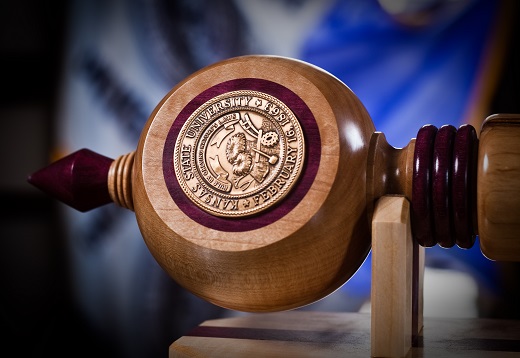
K-State News
ITS receives 2019 E&I Cloud Leadership Award
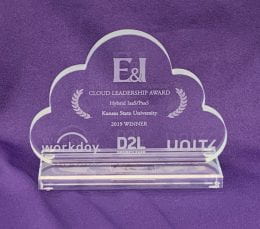 Information Technology (IT) is the recipient of the 2019 E&I Cloud Leadership Award for Hybrid IaaS (Infrastructure as a Service)/PaaS (Platform as a Service). The award recognizes the work of IT staff for their achievements through the innovative use of cloud-first technology. K-State was chosen because of the extensive planning process, the complexity of the project, the hybrid approach to the cloud strategy, and the speed of implementation. There were over 100 applicants for the awards within six categories.
Information Technology (IT) is the recipient of the 2019 E&I Cloud Leadership Award for Hybrid IaaS (Infrastructure as a Service)/PaaS (Platform as a Service). The award recognizes the work of IT staff for their achievements through the innovative use of cloud-first technology. K-State was chosen because of the extensive planning process, the complexity of the project, the hybrid approach to the cloud strategy, and the speed of implementation. There were over 100 applicants for the awards within six categories.
While the fire in Hale accelerated the timeline to move systems to the cloud, K-State was in the process of developing the
IT Strategic Plan
with a priority to modernize the IT infrastructure and move critical services to the cloud.
According to Gary Pratt, CIO, “Many higher education institutions have been moving data center and other services to the cloud, most taking well over a decade to do this. When faced with a disaster, the Hale Library Fire, our IT team came together under compelling circumstances, identified and established strong relationships with vendor partners, and accomplished an unprecedented move to the cloud in a matter of months. This is really an innovative solution that has many different complex components. The accomplishment is a striking example of how the K-State IT Team can overcome any odds and not just survive, but transform our data center services”.
The E&I Cloud Leadership Awards are announced at the annual EDUCAUSE conference in October. K-State’s cloud strategy was evaluated as the best application and design for an institutional hybrid IaaS/PaaS solution. The runner-up was Penn State University.
E&I Cooperative Services (E&I) is the only member-owned, non-profit purchasing cooperative solely focused on serving the needs of education.
K-State researchers make progress on work with industrial hemp
 Researchers at the John C. Pair Horticultural Center near Wichita are growing industrial hemp to determine best practices for Kansas producers.
Researchers at the John C. Pair Horticultural Center near Wichita are growing industrial hemp to determine best practices for Kansas producers.
After one year of growing industrial hemp in test plots, Kansas State University researchers say they’ve moved closer to providing guidance to producers interested in growing the alternative crop in Kansas.
In April 2018, Kansas Gov. Jeff Colyer signed a bill enacting the Alternative Crop Research Act, leading to the legal production of industrial hemp in the state. Kansas is one of 42 states approved to grow the crop; the Kansas Department of Agriculture reported that there were 207 Kansas growers in 2019.
None of those growers, however, had information available to show best practices for growing industrial hemp in Kansas soils.
Listen to Eric Atkinson's interview with Jason Griffin on Agriculture Today
“It’s a brand new crop that nobody in Kansas should have legal experience growing,” said Jason Griffin, director of the John C. Pair Horticultural Center, one of three sites where K-State’s research trials have taken place this year (research was also conducted at K-State facilities in Colby and Olathe). “Since it was new, we needed baseline information on how to grow the crop successfully.”
Griffin noted that “99% of the people growing industrial hemp in Kansas this year were growing for cannabidiol,” better known as CBD. Cannabinoids have high interest among consumers because of their purported medical and therapeutic benefits in humans and companion animals.
CBD and other varieties are legal to grow if they produce less than .3% tetrahydrocannabinol, or THC. If the plant’s THC level is greater than .3%, it is considered marijuana and not legal to grow or possess in Kansas.
“We knew that Kansas farmers wanted to get into this industry,” Griffin said, “and our job is to conduct research to help farmers be successful with the crop.”
Griffin and the research team at the John C. Pair center planted seven CBD varieties, including five in high tunnels, which are plastic-covered structures that provide some protection from the environment compared to open field conditions.
“It’s well-known that high tunnels in the specialty crops arena have certain advantages over crops grown outside,” Griffin said. “For our purposes, it reduced solar radiance, reduced wind and reduced pest presence. But, specifically for hemp, we had our high tunnel completely enclosed in insect screens, which is a really fine netting. We wanted to see if the insect screen would reduce the amount of pollination inside the tunnel. And it appeared it did.”
Griffin said that in the hemp industry, pollination “is a big deal. CBD is produced in the female flower buds, and if those female flower buds get pollinated, your concentration of CBD just tanks into the basement. You get almost none. So you have to keep pollen away from those female flower buds.”
That caused problems for the hemp varieties that K-State grew outside, Griffin said, noting that pollen can travel as far as three miles. “I think it would be very difficult to have a large-scale, outdoor CBD production system successfully without somehow protecting those plants from pollen.”
Because they were protected from insects and other pollinators, “the plants inside the high tunnel were just superior,” Griffin said. “In that protected environment, they were larger and had more flower buds. Because they had more buds, they had a higher CBD content.”
K-State’s work also looked at various production systems, including growing the plants with organic and conventional fertilizer. Researchers also looked at the potential of growing industrial hemp for fiber and grain.
The university’s work will continue in 2020, Griffin said. “This was our first year,” he said. “We probably made some mistakes and we’ll probably improve as any grower might as they get more experience with a crop.”
Griffin said updated information on K-State’s research with industrial hemp is available on Facebook. More information about the John C. Pair Horticulture Center also is available online.
K-State Faculty Highlights
Teagarden recognized as Professor of the Week
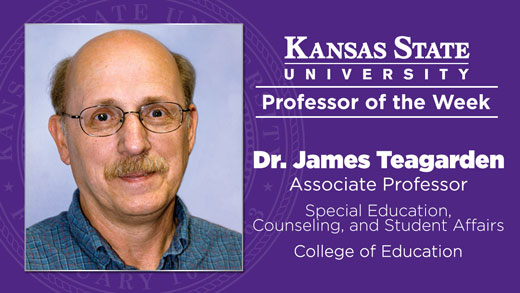 James "Jim" Teagarden, associate professor in the special education, counseling and student affairs department, was recognized as Professor of the Week at the Dec. 29 men's home basketball game.
James "Jim" Teagarden, associate professor in the special education, counseling and student affairs department, was recognized as Professor of the Week at the Dec. 29 men's home basketball game.
Teagarden has been a faculty member in the department since 2005. Teagarden's personal and professional journey is described in the College of Education's documentary series, "A Walk in My Shoes," in this way: "When Jim Teagarden was just a small boy, he witnessed an act of injustice that stayed with him throughout his life. Years later a chance encounter with a teacher got him thinking about how he could make a change for the better. For more than 20 years, Jim worked as a special education teacher in Marysville, Kansas, working with children with severe emotional and behavior disorders. Today Jim is helping to train the next generation of special education teachers at Kansas State University." His passion for caring and educating all individuals is demonstrated by his commitment to effective and innovative instruction. He teaches and models for his students the strategies and dispositions necessary for successful teaching and learning proficiencies.
An example of his exemplary educational accomplishment is Teagarden's leadership in the university and community organization Project EXCELL. Teagarden spends Saturday mornings with individuals of all abilities providing experiences designed to enhance one's quality of life. Teagarden's belief in equity and access drives his motivation to engage and inspire future educators. The future educators privileged to be taught and mentored by Teagarden and faculty honored to be a colleague of Teagarden have expressed their appreciation for the exceptional quality of his instruction and mentoring and have nominated him for multiple awards. Selected awards presented to Teagarden are listed below.
Teagarden's instructional expertise is another point of pride for the college and university. He is a highly respected researcher in special education, specifically behavioral disorders with an emphasis on violence prevention with behavioral and emotionally challenged students. He is a principal author in the journals and a leader in the behavioral disorder professional organizations. Finally, he is a frequently sought out presenter and consultant in this most challenging field.
Teagarden earned his Doctorate of Education in special education in May 2002 from Kansas State University; Master of Science in special education in December 1986 from K-State; and Bachelor of Science in elementary education in May 1984 from K-State.
Selected honors and awards:
James R. Coffman Award for Outstanding Service to the Honor Council, faculty representative, 2014; Susan Phillips Gorin Award Nominee, Council for Exceptional Students, 2012; Kathryn A. Holen Faculty Excellence in Service Award Nominee, Kansas State University, 2012; Susan Phillips Gorin Award Nominee, Council for Exceptional Students, 2011; College of Education Faculty Excellence in Service Award Nominee, Kansas State University, 2011; Commerce Bank Outstanding Undergraduate Teaching Award Nominee, Kansas State University, 2011; Adviser of the Year Nominee, Kansas State University, Blue Key, 2010.
The Professor of the Week recognition is coordinated by Faculty Senate, the president's office, K-State Athletics and the Division of Communications and Marketing. Recipients are faculty members selected by Faculty Senate caucuses. Those selected are provided tickets to a men's home basketball game of their choosing and are recognized during halftime. This is just a small token of appreciation for those who teach at K-State.
Zelia Wiley receives administrator role model award
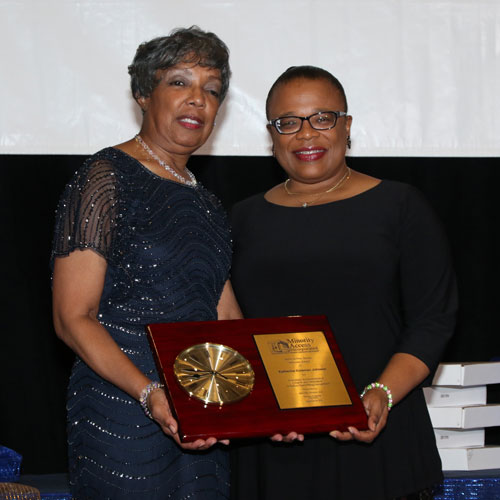 Zelia Wiley, assistant dean and director of diversity programs in the College of Agriculture, was named a recipient of the 2019 Administrator Award from Minority Access Incorporated at its National Role Models Conference.
Zelia Wiley, assistant dean and director of diversity programs in the College of Agriculture, was named a recipient of the 2019 Administrator Award from Minority Access Incorporated at its National Role Models Conference.
Minority Access' Role Models Project honors inspiring students, faculty, alumni, innovators and diverse institutions as role models to expand the pool of minority scientists, researchers and professionals in fields underrepresented by minorities. The Administrator Award is presented to individuals for their exemplary achievements in expanding opportunities for others. Wiley was nominated for the award by a colleague at Michigan State University.
Wiley joined the university in 2003 as the first assistant dean for diversity. She is responsible for recruitment and retention programs of ethnic minorities within the College of Agriculture and works to increase the minority ethnicity application pool in K-State Research and Extension. During her tenure, she has seen significant increases in the multicultural student populations within the college.
Wiley is the director of Project IMPACT and co-principal investigator for the Kansas Louis Stokes Alliance for Minority Participation, known as KS-LSAMP. She is involved with the Cargill College for A Day program, "Growing Our Mindset" diversity forum, and KSRE Summer Research Fellowship Program. She serves as chapter advisor for the K-State chapter of Minorities in Agriculture, Natural Recourses and Related Sciences, known as MANRRS, and was president for the national group in 2007-08. She is the chair of the College of Agriculture's diversity committee and serves on the President's Commission for Multicultural Affairs. She was the first ethnic minority to serve on the board of consultants for the FFA National Board. Wiley also served as chair of the Black Faculty and Staff Alliance at K-State. She has received several awards, including the 2011 Commerce Bank Presidential Award for enhancing diversity at K-State.
K-State Student News
K-State horse judging team captures two world titles
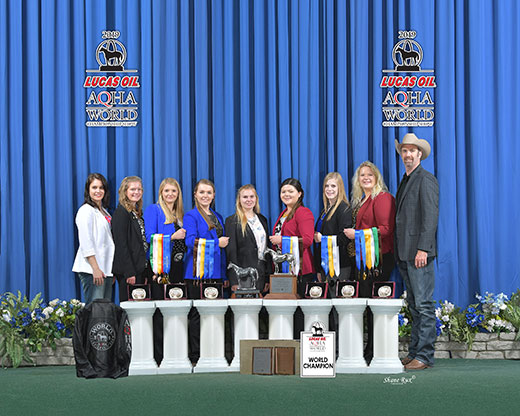 Members of Kansas State University’s 2019 horse judging team include (l to r) Clarissa Conrad, assistant coach; Krissy Isle, Coffeyville; Alley Leslie, Inman; Lauren Greiner, Papillion (Nebraska); Taylor Bachtel, Leavenworth; Emily Prugh, Elkhart (Indiana); Emily Meier, Goddard; Erin LeKamp, New Berlin (Illinois); and head coach James Lattimer. Assistant coach Rachel Sorenson is not pictured. (Courtesy photo)
Members of Kansas State University’s 2019 horse judging team include (l to r) Clarissa Conrad, assistant coach; Krissy Isle, Coffeyville; Alley Leslie, Inman; Lauren Greiner, Papillion (Nebraska); Taylor Bachtel, Leavenworth; Emily Prugh, Elkhart (Indiana); Emily Meier, Goddard; Erin LeKamp, New Berlin (Illinois); and head coach James Lattimer. Assistant coach Rachel Sorenson is not pictured. (Courtesy photo)
The Kansas State University horse judging team captured a bit of history this fall when the squad won two of the most prestigious contests offered for collegiate competitors.
K-State won the American Paint Horse Association title in September and followed that up with a victory at the American Quarter Horse Association contest in mid-November. It’s the first time that any four-year school has pulled off the judging double, according to head coach James Lattimer.
“It’s always great to see young people succeed,” said Lattimer, an assistant professor of animal science. “I attended K-State and judged here just as they did and had some success on the judging floor, but it pales in comparison to the pride you have as the coach and seeing a young person succeed.”
Listen to a radio interview with the champions
Like other livestock judging contests, horse judging requires team members to evaluate any of a dozen classes of horses, place them according to pre-determined criteria, and provide oral reasons for those placements to judges.
“At a collegiate level, it’s very difficult,” said team member Emily Prugh, a senior from Elkhart, Indiana. “You really have to step up your game and you have to be creative in the reasons room. But we practice intensely so that we are ready for the contest and we really know our stuff when we walk into that contest. You’re no longer scared of what might happen, but excited to show your abilities.”
In addition to Prugh, team members included Taylor Bachtel of Leavenworth, Kansas; Lauren Greiner of Papillion, Nebraska; Krissy Isle of Coffeyville, Kansas; Erin LeKamp of New Berlin, Illinois; Ally Leslie of Inman, Kansas; and Emily Meier of Goddard, Kansas.
K-State graduate students Clarissa Conrad and Rachel Sorensen were assistant coaches.
“I think what makes these two wins even more special is just knowing that we were a group of young people coming from different states and different backgrounds and we all came together and grew a tight-knit bond,” Meier said. “It really was ordinary people doing extra-ordinary things.”
Added Leslie: “We all got into this last spring and we were hoping to come back with wins. But I don’t think any of us truly thought we could pull it off. Being able to do that…I’m really proud of that.”
The AQHA contest has been held for 40 years. K-State has won that contest four times in the past 11 years, most recently in 2017. The APHA contest is just in its fourth year.
K-State’s prep for the national contests is a lot like what sports teams go through. The team was practicing 10-12 hours a week outside of class time, sometimes between classes or early in the morning.
“We all had to work together outside of the contest, during practice, sharing reasons terms and talking about classes (of horses),” Prugh said. “By working together, we were able to give ourselves a competitive edge and I think that makes our win even more special.”
“You have great years and world championship years and then you have years that are quite opposite of that,” Lattimer said. “And the difference between those is work ethic, dedication and a competitor’s spirit.”
More information about K-State’s horse judging team is available online.
Phillips 66 Business Ethics Case Competition awards $5,000 to K-State students
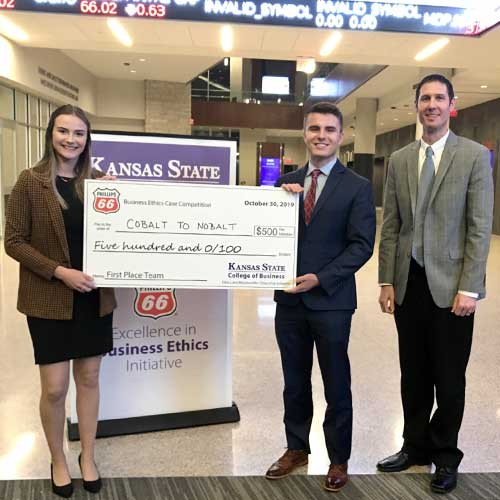 The Kansas State University College of Business Administration recently awarded $5,000 in scholarship money to 19 students as a result of the 2019 Phillips 66 Business Ethics Case Competition.
The Kansas State University College of Business Administration recently awarded $5,000 in scholarship money to 19 students as a result of the 2019 Phillips 66 Business Ethics Case Competition.
A total of 274 students representing 80 teams entered the competition, which was organized by the college’s Ethics and Responsible Business Citizenship Initiative and sponsored by Phillips 66.
Students were challenged to examine a real-world ethical dilemma and were responsible for analyzing the situation, applying appropriate ethical and strategic management principles, and developing a viable set of practical recommendations. After a contingent of faculty in the department of management evaluated the initial written analyses, six teams were selected to compete in the final round where they presented their analysis and recommendations to a panel of judges.
"Phillips 66 is proud to support the Business Ethics Case Competition and encourages the thoughtful discussion around the way Corporations should operate today," said Seth Sanders, Phillips 66 supervisor IT F&PA and lead campus recruiter. "The presenting groups all did a wonderful job! It was great to see K-Staters take a broader, more holistic view of the corporate purpose and demonstrate how long-term value can be generated for all stakeholders."
The winning team was made up of senior in accounting Nathan Hartter, senior in marketing Kirsten Painter, and senior in finance Taylor Werner. Each member of the winning team received $500.
The second-place team, which was awarded $350 per team member, was comprised of senior in management Nicole Bolte, senior in management Makenna Dandurand, senior in management Jared Grieve, and senior in management Natalie Longhurst.
Taking home third place and $250 each was the team of senior in management Samuel Hummer, senior in management information systems Rebecca Jenkins, and senior in finance Douglas Kellerman.
Members of the remaining three finalist teams received an honorable mention award of $150 for advancing through to the final round. Those receiving the honorable mention designation include senior in finance Tyler Dallam, senior in finance Aaron Gallaway, senior in finance Olivia Mangual, senior in marketing Kellie Gabriel, senior in management information systems Kate Gleason, senior in marketing Wyatt Regehr, senior in management Jacob Schmidt, senior in marketing Karaline Schreiner, and senior in management Hannah Smith.
"This competition provides a unique opportunity for our students to improve their analytical, decision-making and presentation skills," said Bill Turnley, Sam and Karen Forrer chair of business ethics and head of the management department. "The finalists’ presentations were very compelling, with recommendations that were well justified and that did a nice job of balancing strategic and ethical concerns. We appreciate the support from Phillips 66 that makes this competition possible."